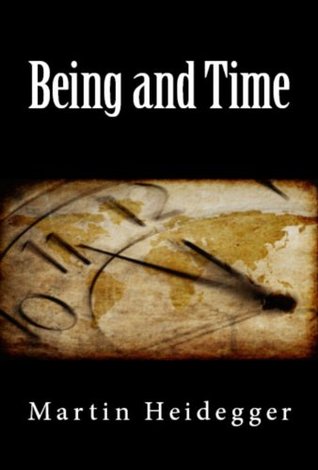More on this book
Community
Kindle Notes & Highlights
Is fearing in the face of something merely an expecting of something threatening which is coming on?
Aristotle rightly defines “fear” as λύπη τις ἢ ταραχή—as “a kind of depression or bewilderment”.(vi)
The Present of anxiety holds the moment of vision at the ready [auf dem Sprung]; as such a moment it itself, and only itself, is possible.
Thematizing Objectifies.
a world must have been disclosed to it.
Circumspective concern includes the understanding of a totality of involvements, and this understanding is based upon a prior understanding of the relationships of the “in-order-to”, the” towards-which”, the “towards-this”, and the “for-the-sake-of”. The interconnection of these relationships has been exhibited earlier(xxiv) as “significance”. Their unity makes up what we call the “world”.
Thus the significance-relationships which determine the structure of the world are not a network of forms which a worldless subject has laid over some kind of material.
Whenever one comes across equipment, handles it, or moves it around or out of the way, some region has already been discovered.
TEMPORALITY
history becomes in principle accessible only as the Object of a science.
We contend that what is primarily historical is Dasein. That which is secondarily historical, however, is what we encounter within-the-world—not only equipment ready-to-hand, in the widest sense, but also the environing Nature as ‘the very soil of history.’
human Dasein is the primary ‘subject’ of history;
Will taking over the thrownness of the Self into its world perhaps disclose a horizon from which existence snatches its factical possibilities away?(1)
Only in communicating and in struggling does the power of destiny become free.
The steadiness of existence is not interrupted thereby but confirmed in the moment of vision.
Here as there, formalism, the cult of the form; the defining of relationship is the last word in wisdom.
While it is said that “if you were quiet, you would be strong”, the variant is also true that “if you are quiet, you will perceive—that is, understand” ’ (p. 26). ‘And then I enjoy the quietude of soliloquizing and communing with the spirit of history. This spirit is one who did not appear to Faust in his study, or to Master Goethe either. But they would have felt no alarm in making way for him, however grave and compelling such an apparition might be. For he is brotherly, akin to us in another and deeper sense than are the denizens of bush and field. These exertions are like Jacob’s
...more
Just as I am Nature, so I am history...’ (p. 71).
Thus there is no longer any actual philosophizing which would not be Historical.
‘But you are acquainted with my liking for paradox, which I justify by saying that paradoxicality is a mark of truth, and that the communis opinio is nowhere in the truth, but is like an elemental precipitate of a halfway understanding which makes generalizations; in its relationship to truth it is like the sulphurous fumes which the lightning leaves behind. Truth is never an element. To dissolve elemental public opinion, and, as far as possible, to make possible the moulding of individuality in seeing and looking, would be a pedagogical task for the state. Then, instead of a so-called public
...more
Because temporality is ecstatico-horizonally constitutive for the clearedness of the “there”, temporality is always primordially interpretable in the “there” and is accordingly familiar to us. The
time is ‘merely subjective’ or ‘Objectively actual’,
the ‘natural’ clock,
Our understanding of the natural clock develops with the advancing discovery of Nature, and instructs us as to new possibilities for a kind of time-measurement which is relatively independent of the day and of any explicit observation of the sky.
Within-time-ness and the Genesis of the Ordinary Conception of Time
“For this is time: that which is counted in the movement which we encounter within the horizon of the earlier and later.”(vii)
Significance belongs to the structure of the “now”.
Thus even Plato, who directed his glance in this manner at time as a sequence of “flows” arising and passing away, had to call time “the image of eternity”:
time is infinite.
Why do we say that time passes away, when we do not say with just as much emphasis that it arises? Yet with regard to the pure sequence of “nows” we have as much right to say one as the other.
But if nothing other than the soul or the soul’s mind were naturally equipped for numbering, then if there were no soul, time would be impossible.’—Tr.]
Hence it seemed to me that time is nothing else than an extendedness; but of what sort of thing it is an extendedness, I do not know; and it would be surprising if it were not an extendedness of the soul itself.’—Tr.)
This negating of the negation is both that which is ‘absolutely restless’ in the spirit and also its self-manifestation, which belongs to its essence.
Time is ‘abstract’ negativity. As ‘intuited becoming’, it is the differentiated self-differentiation which one comes across immediately; it is the concept which ‘is there’ [“daseiende”]—but this means present-at-hand. As something present-at-hand and thus external to spirit, time has no power over the concept, but the concept is rather ‘the power of time’.(xxxix)
Hegel’s ‘construction’ was prompted by his arduous struggle to conceive the ‘concretion’ of the spirit.
Does time itself manifest itself as the horizon of Being?


